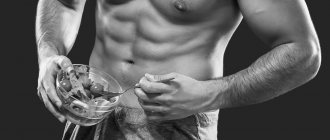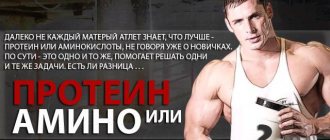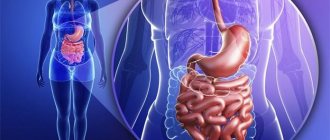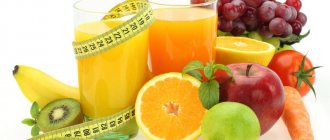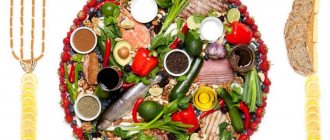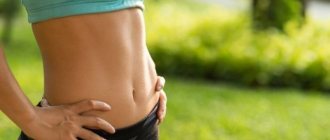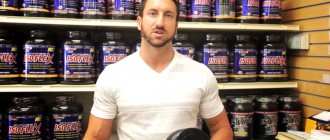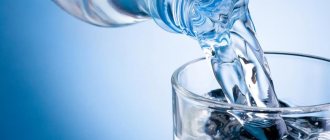Nutrition Basics for Athletes
Features of nutrition for athletes:
- When creating a menu for every day, it is very important to calculate the number of calories so that there is no excess or deficiency. To burn fat, i.e. To lose weight, there must be a deficit, and to gain weight, there must be a surplus.
- It is important to follow the athlete's diet. You need to eat every 3-4 hours to keep your digestive system working well. Moreover, this is relevant for those who need to burn extra pounds or, conversely, build muscle. Only the serving size will differ depending on the required number of calories.
- When creating a diet for athletes, take into account your figure. For those who do not tend to gain extra pounds, you can eat with a calorie surplus. For those who have a proportional physique, it is only necessary to maintain their shape by observing the norm of the energy value of food. For athletes who are prone to gaining excess weight, it is advisable to maintain a calorie deficit.
A healthy diet for people involved in sports must be balanced. This is the only way to stay in good shape.
Diet options for athletes depending on the regime and load
As is already clear, proper nutrition for athletes will depend on the training regimen, type of activity and level of load. A simple diet option for approximately 2600 kcal could be something like this:
- Breakfast. A couple of boiled eggs, about 200 grams of low-fat cottage cheese, a plate of oatmeal with milk with a little olive oil, a couple of pieces of bran bread, tea.
- Lunch. A couple of fruits, a bun, a glass of natural low-fat yoghurt.
- Dinner. Buckwheat with milk, an omelet from a couple of chicken eggs, about 200 grams of vegetable salad, 3 slices of whole grain bread, about 50 grams of low-fat cheese, tea.
- Afternoon snack. 150 grams of low-fat cottage cheese, half a plate of any porridge with fruits or berries, a glass of juice.
- Dinner. 250 grams of fresh fruits or vegetables, a couple of slices of bran bread, a glass of kefir.
- An hour before bedtime, you can eat an apple and drink a glass of milk/kefir.
And this is an enhanced diet for an athlete, which is designed for 3500 kcal.
- Breakfast. A plate of oatmeal, a four-egg omelette, an orange, a couple of pieces of toast or bread.
- Lunch. A glass of yogurt, a couple of bananas, 50 g of nuts.
- Dinner. 200 grams of boiled beef meat, 4 medium potatoes, 150 grams of vegetable salad, tea or juice.
- Afternoon snack. A glass of boiled rice, 150 grams of fruit salad, a glass of milk.
- Dinner. Boiled fish, 4 boiled potatoes, salad of 120 grams of grated carrots and olive oil.
- A couple of hours before bed, eat half a plate of oatmeal, four boiled eggs and drink a glass of milk.
The following diet for athletes is suitable for training days .
- Breakfast. Three eggs, a couple of pieces of toast with jam or peanut butter, a bowl of oatmeal, a glass of milk.
- Lunch. Energy protein bar, tea or coffee.
- Dinner. 250 grams of mixed vegetables, half a liter of chicken soup, 250 grams of boiled beef, juice, a little cracker.
- Afternoon snack. Compote, fruit drink or juice, bun.
- Dinner. 150 grams of stewed fish, 180 grams of boiled vegetables, tea.
- An hour before bedtime - a piece of bran bread, a milkshake with a banana.
This menu is suitable for intensive preparation :
- Breakfast. High-carbohydrate sports drink, 180 grams of boiled rice with vegetables, a couple of slices of bread.
- Lunch. 3 pancakes with honey or condensed milk, a quarter of pineapple, juice or compote.
- Dinner. Salad with mayonnaise, 6 baked potatoes with cheese, 250 grams of beef stew.
- Afternoon snack. Protein bar and sports drink.
- Dinner. Stewed fish, half a plate of buckwheat, herbal tea.
- A couple of hours before bedtime, you can drink a glass of juice and eat 200 g of oatmeal.
And one more option for the daily diet is designed directly for the day of the competition :
- Breakfast. A couple of buns with raisins, a plate of buckwheat, a glass of milk.
- Lunch. Banana, meat sandwich, 60 grams of dark chocolate, coffee.
- Dinner. 500 ml of chicken broth, boiled lean fish, a plate of vegetable stew, a couple of pieces of oatmeal bread, juice or compote.
- Afternoon snack. A bun with raisins, a glass of juice.
- Dinner. 160 grams of chicken stew, green tea.
- A couple of hours before bedtime - a portion of oatmeal, a couple of pieces of bran bread, one pear, tea.
Thus, an athlete’s diet can be different depending on the level of load, goals, and type of activity. But it is important that it saturates the body with everything it needs.
Authorized Products
Food should be varied, containing proteins, carbohydrates and fats.
Squirrels
This element is important both on an athlete’s diet for weight loss and for those who are gaining weight. Proteins are involved in the formation of muscle tissue. This is what makes the body slim, fit, strong. List of healthy protein foods:
- low-calorie meat (turkey, rabbit, veal, etc.);
- dairy products (low-fat curd mass, cheese, milk);
- eggs;
- fish;
- legumes
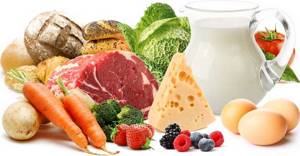
physiologically complete. In order for these protein products to bring maximum benefit, you need to use the correct cooking method. You can’t fry them, it’s better to boil, stew or steam them. It is not recommended to use a large amount of oil during cooking, because... This creates harmful saturated fats and trans fats.
Carbohydrates
There is an opinion that those who want to lose extra pounds should not eat foods rich in carbohydrates. Indeed, you can lose weight on a diet low in these elements, but such a diet can harm the body.
Such nutrition systems are especially not recommended for athletes. High physical activity requires a lot of energy. Its main source is carbohydrates. If there are few of them, then the person will experience a loss of strength, poor health, worsening brain activity, etc.
That is why a balanced diet for athletes must include a sufficient amount of carbohydrates. It is important to know that they are divided into simple and complex. The first type is called fast, because they almost immediately break down into sugars and penetrate the circulatory system. This interferes with weight loss. As a result, any sweets are deposited in the form of fatty layers. Therefore, the consumption of such carbohydrates is undesirable.
Complex elements are also called slow. They take longer to break down, feeding the body for a long time. These are the carbohydrates recommended for intense sports training. Complex elements are contained in:
- rice;
- buckwheat;
- whole grain bread;
- oat bran and flakes;
- potatoes;
- hard pasta.
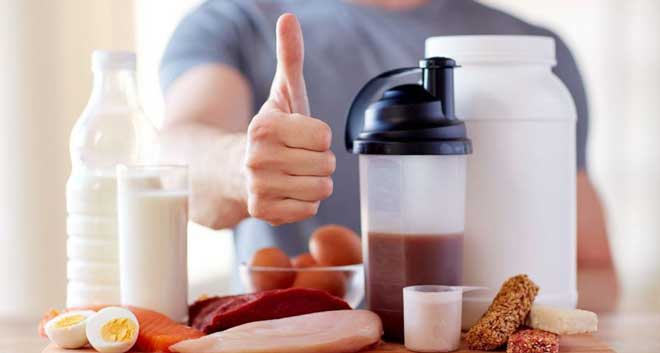
In athletes, the body's energy consumption is determined by the duration, intensity and nature of physical activity.
Simple carbohydrates are found in:
- sugar;
- fruits and vegetables;
- white bread;
- honey, jam, jam;
- sweets.
It is not recommended to completely give up simple carbohydrates. It is advisable to consume them in moderate quantities immediately after training. This will help quickly replenish expended energy and prevent processes that destroy muscle tissue.
Fats
Nutrition for athletes must contain fat. They are necessary in the same way as carbohydrates and proteins. There is an opinion that these substances provoke the accumulation of extra pounds and the formation of cholesterol plaques. In fact, there are healthy fats too. They improve the condition of nails and hair, stimulate the immune system, activate growth hormone, and promote rapid muscle recovery.
Healthy fats are found in:
- vegetable oils;
- sea fish;
- nuts;
- seeds;
- avocado.
Saturated fats are found in:
- dairy products;
- egg yolks;
- lard;
- sausages.
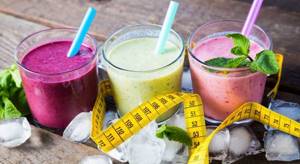
The distribution of daily calorie intake throughout the day depends on the time and number of training sessions.
Saturated fats are allowed for consumption, but in very limited quantities (no more than once a week). Otherwise, they can provoke the appearance of cholesterol plaques.
There are also trans fats. They are formed as a result of hydrogenation of vegetable oils. They are often used in fast food. Trans fats are very harmful and should not be consumed. They can cause cardiovascular diseases, sexual dysfunction, deterioration of metabolic processes, etc.
Homemade sports cocktail recipes for gaining muscle mass
1. To prepare the recipe at home you need to: beat a banana with 50 g of cottage cheese, add honey and a glass of milk. This homemade recipe is ready to serve as a snack or dessert.
2. You can make a higher calorie chocolate shake with this homemade recipe. For the recipe, prepare: 50 g of cottage cheese, a spoonful of cocoa powder, 1 glass of milk, twenty grams of grated chocolate and some walnuts. A homemade cocktail according to this recipe is quite satisfying and healthy.
As you can see, in home recipes for weight gain the portion of carbohydrates is increased. Such homemade recipes are enriched with high-calorie fruits, honey, higher-fat cottage cheese and milk. You can also add nuts and corn flakes to sports cocktails and desserts.
Sports supplements
Athletes are recommended to diversify their diet with special supplements containing substances necessary for the body that are not produced naturally or are supplied with food in insufficient quantities. They increase endurance, thereby improving strength and speed performance.
It is recommended to use only natural products, and not steroids that affect hormones. A list of such additives is given below.
Protein
This is the powder used to make protein shakes. It does not contain carbohydrates and fats and is suitable for weight loss. Allows you to fill your daily protein needs without exceeding the calorie content. Such proteins are absorbed faster than those found in conventional foods.
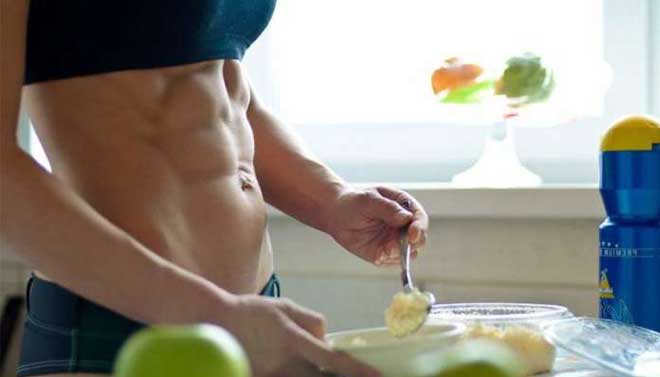
Food should always be taken at the same time - then the digestive organs will function better.
There is concentrated protein for vegetarians. It does not contain animal proteins, only soy, as well as beneficial amino acids and trace elements.
Gainer
This supplement contains not only proteins, but also carbohydrates, which prevent muscle breakdown. Gainers charge the athlete with energy. They are not suitable for people who want to lose weight. They should also be used with caution by people who are trying to stay in shape. Gainers are best suited for those who are not at all prone to obesity.
BCAA
This is an amino acid mixture containing:
- leucine;
- isoleucine;
- valine
These elements help build muscle and prevent muscle breakdown. These substances are not synthesized in the body naturally; they only come from food.
Creatine
This substance is produced naturally in the liver. It allows you to quickly replenish energy after intense workouts. Often, naturally synthesized creatine is not enough for athletes. Its deficiency can be compensated for by concentrated supplements.
L-carnitine
This substance not only helps you lose extra pounds faster, but also improves brain activity and increases the body's resistance to stress. Carnitine promotes the transport of fats into the mitochondria, where they are destroyed and energy is released. The substance increases endurance and reduces fatigue, which allows you to get a better effect from physical activity.
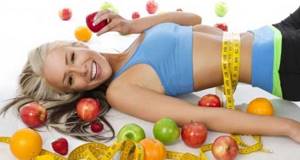
Sports nutrition provides athletes with the necessary amount of calories, microelements and vitamins.
To develop strength and endurance

The most popular sports nutrition for these purposes:
- Creatine;
- Pre-workout complex;
- Some SARMs.
The most popular product for developing strength is creatine. You can take it in two ways:
- With loading;
- No download.
In the first case, we take creatine 4 times a day, one serving (5 g) for a week. Next, we maintain the level of this substance in the body. Reception without loading is carried out as usual: 5-10 g per day.
Another sports nutrition that helps develop strength and endurance is a pre-workout complex. The components included in the pre-workout help not only to cheer you up, but also to increase the duration of your workout. Such supplements perfectly stimulate the central nervous system and help get rid of feelings of tiredness and tiredness.
It is fair to note the advisability of taking BCAA for the development of these indicators. If you are interested in much greater results, then you can use selective androgen receptor modulators, or SARMs for short.
Menu for athletes
An example of a correct athlete's menu:
- dietary meat 0.4 kg;
- low-calorie cottage cheese 400 g;
- butter 30 g;
- whole grain bread 200 g;
- various porridges 500 g;
- fruits and vegetables 300 g each;
- eggs 4-5 pcs.
Most calories should come at lunch.
For a strength athlete
If the goal is to gain muscle mass, then the diet for athletes must include a lot of protein. If you cannot get it in the required amount with regular food, you can purchase natural supplements.
For girls
What can girls who are actively involved in sports eat:
- first breakfast - 3 eggs, 100 g oatmeal;
- second breakfast - 0.5 liters of kefir or milk;
- lunch - brown rice 150 g, salad with chicken breast and herbs, sea fish 200 g;
- afternoon snack - a handful of nuts and cottage cheese 200 g;
- dinner - salad or fruit, meat or fish 200 g (you can find many interesting recipes on the Internet);
- before bed - kefir or any other fermented milk drink 0.5 l.
No more than 3 hours should pass between meals. In addition to proteins, fats and carbohydrates, the diet contains plant fiber.
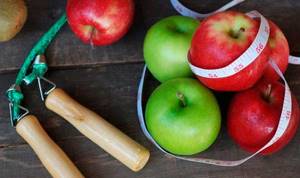
The ideal scheme is 5-6 meals a day with meals in small quantities every 2-3 hours.
General recommendations
Eating food should take place in a calm environment, without haste. Food must be chewed thoroughly. After eating a meal, a person should not feel either overeating or hunger. It is very important to observe the drinking regime. You need to drink at least 1.5-2 liters of liquid. These can be teas, compotes, fruit drinks, freshly squeezed juices, filtered or mineral water without gases.
Three rules for creating a sports diet for every day
All nutritionists and sports nutrition specialists adhere to three basic rules when creating a menu.
Eliminate alcohol and add water
When drinking alcoholic beverages during training, the following undesirable processes occur:
- blocking protein breakdown, because of this muscle tissue does not receive the necessary nutrition;
- removal of water from the body, which disrupts all chemical and metabolic processes;
- blocking the production of energy necessary for training; most of it is spent on breaking down alcohol and removing its breakdown products.
In addition, alcoholic drinks have a bad effect on the heart, liver, and kidneys. During sports, they experience increased stress, which can result in serious pathological conditions.
It is important to maintain water regime. You need to drink 1.5 liters of liquid, from which:
- 300 ml falls 2 hours before training;
- 100 ml 15 minutes before class;
- 300 ml after physical activity.
Maintaining a drinking regime helps avoid dehydration and increases the effectiveness of training.
Healthy proteins, fats and carbohydrates
For athletes, the amount of carbohydrates consumed per day should be 9 g per 1 kg of body weight per day. When preparing for competitions, their amount is reduced to 2.5-3 g. The required amount of protein is 1.5 g per 1 kg of a person’s weight. The amount of healthy fats reaches 0.5 g per 1 kg of body weight.
Vitamins and microelements
For proper nutrition, it is important to get vitamins and minerals into the body. If there are not enough of them with food, then after the recommendation of a nutritionist, you can take them in concentrated form in the form of pharmaceutical preparations.
The success of sports training directly depends on a balanced diet. If a person wants to achieve results in this matter, he must adhere to a proper diet, give up junk food and alcoholic beverages.
